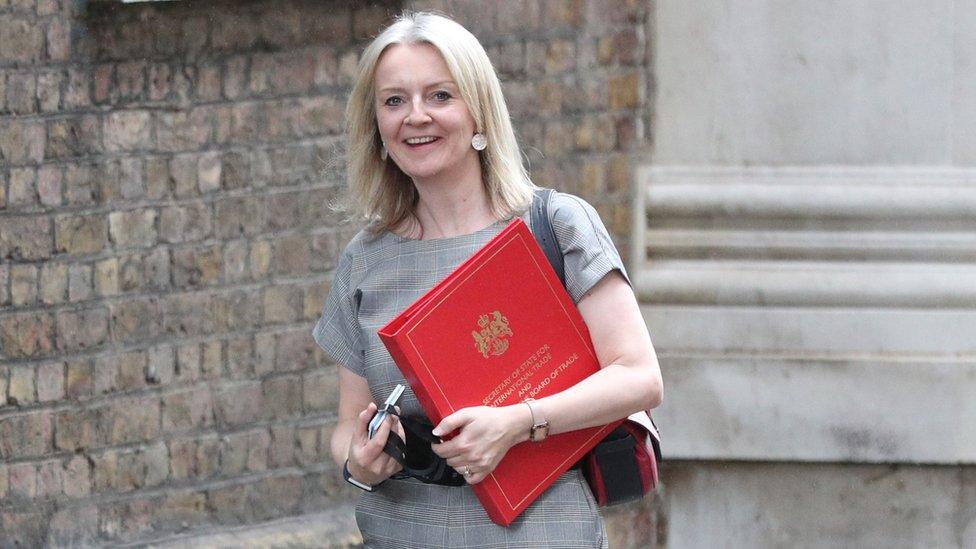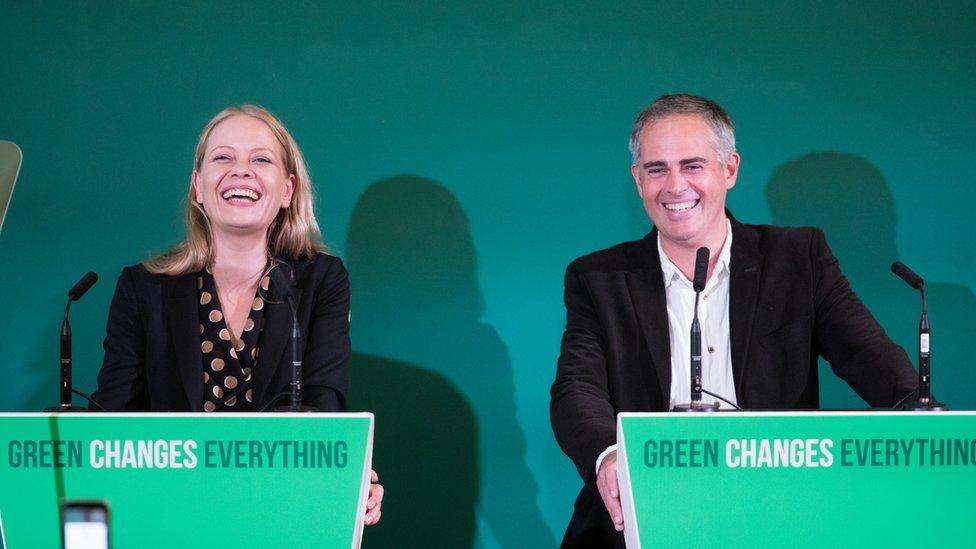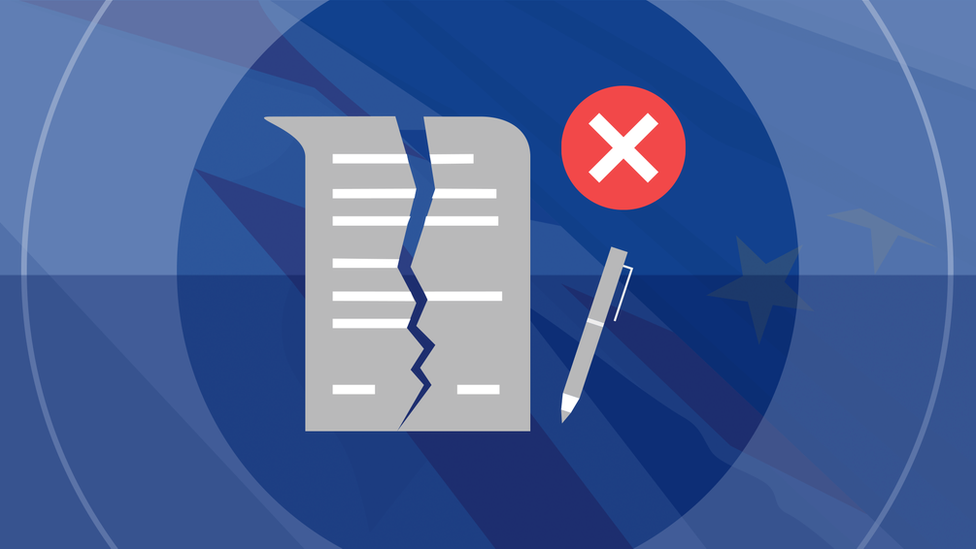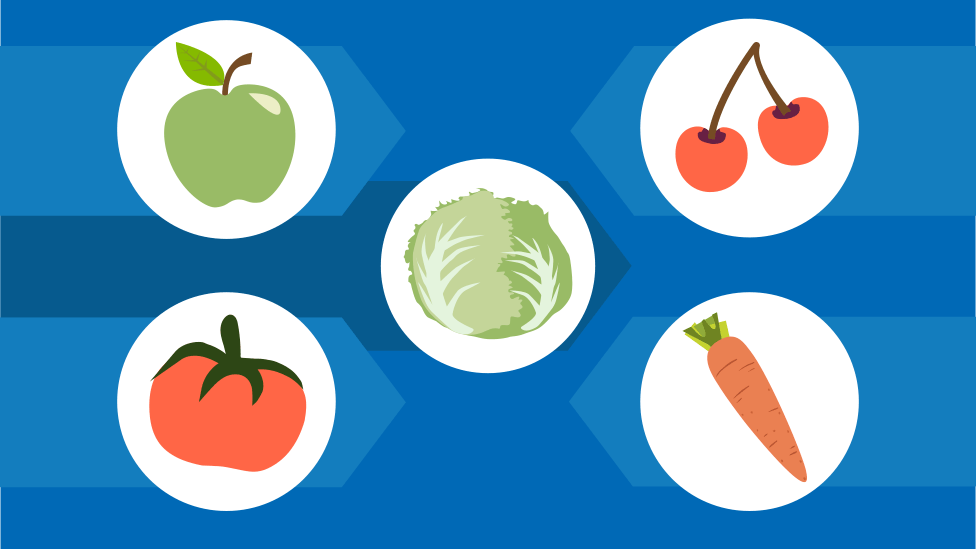Brexit: Caroline Lucas criticised over all-female cabinet plan
- Published
- comments
Caroline Lucas tells the BBC's Victoria Derbyshire why she wants an all-women cabinet
A Green Party MP has been criticised after suggesting an all-women "emergency cabinet" could meet to try to stop a no-deal Brexit.
Writing in the Guardian,, external Caroline Lucas said the cross-party group, formed of 10 female politicians, could "bring a different perspective".
Ms Lucas said the cabinet could organise another EU referendum if the PM is defeated in a no-confidence vote.
But cabinet minister Liz Truss criticised the plan as sexist.
Ms Lucas - a former leader of the Green Party - has also apologised after receiving criticism for only inviting white women to sit on her proposed group.
In her article, she suggested MPs opposed to a no-deal Brexit should try to defeat Boris Johnson in a no-confidence vote, then replace him with a "national unity government".
This arrangement - when a group of MPs from different parties choose to work together - has not been seen since the Second World War.
An all-female cabinet, she suggested, could then "press the pause button" and organise another referendum offering a choice between staying in the EU or the government's Brexit plan, whether that is an agreed deal or no deal.
Women 'less tribal'
But her idea was criticised by International Trade Secretary Liz Truss, who tweeted: "Is there anything more sexist than claiming your gender determines your worldview/behaviour/attitude?"
Defending her proposal, Ms Lucas told BBC Radio 5 Live: "It is a generalisation and there are plenty of exceptions, but I would argue, generally and in my experience, women tend to be less tribal and tend to find it easier to establish trust more quickly.
"I simply want to see whether or not by bring women together the key women from across Westminster whether or not we could generate a new dynamic," she added.
"We are facing a crisis. Time is running out."

Liz Truss criticised the proposals as sexist
Among the women Ms Lucas has invited to join her are Labour's shadow foreign secretary Emily Thornberry, Liberal Democrat leader Jo Swinson, Scotland's First Minister Nicola Sturgeon, Conservative MP Justine Greening, and Plaid Cymru Westminster leader Liz Saville Roberts.
The others are: Heidi Allen, Kirsty Blackman, Yvette Cooper, Sylvia Hermon, and Anna Soubry. She has asked to meet the 10 women in the coming days.
On Monday, Ms Lucas told the BBC she had received responses from five of the women she has written to, expressing differing levels of interest.
She also added that her proposed unity government would have to be led by a female Labour MP, as they would be representing the largest opposition party.
She said she wasn't completely against involving men - for instance accepting that a key anti-Brexit campaigner like Dominic Grieve could be given a cabinet seat.
'Different perspective'
Asked about her invitation to join the proposed female cabinet, Ms Sturgeon said: "I'm happy to work with anybody, male or female, to try to stop Brexit".
"I'm all for more women in politics, I think we can bring a different perspective," she told ITV's Loose Women.
"But I do feel duty-bound to point out that the former prime minister of course was a woman and didn't manage to sort out Brexit - so there's maybe a flaw in that argument."
Ms Thornberry tweeted a reply, external to say she would not be able to take part in the planned talks because she is currently on holiday.
She added that returning the issue of Brexit "to the people" was the "best route to go down at this point".
"My fear with the other suggested route - imposing some alternative coalition government without any reference to the public - would risk worsening the feelings of anger and resentment towards 'Westminster' that have led us into this Brexit mess," she added.
Ms Saville Roberts welcomed Ms Lucas's bid to break the deadlock over Brexit, but said she was "not entirely comfortable" that only women would be involved.
Ms Soubry, who leads the Independent Group for Change, said she believed in the "power of women", but a national unity government should be formed "irrespective of gender".
Ethnic composition criticised
Ms Lucas has also faced criticism for the fact that all ten women she invited to join her proposed cabinet are white.
One of her critics, Labour MP Clive Lewis asked: "Where are the BAME [black, Asian and minority ethnic] women politicians?"
In a statement posted on Facebook, external on Monday, Ms Lucas wrote: "An all-white list of women isn't right".
"I should have reached out further and thought more deeply about who, and what kind of politics, an all-white list represents. I apologise."
"There are women of colour colleagues who are standing up to this government's reckless gamble with Britain's future, and it was wrong to overlook them."

Should we compare men and women?
Dr Helen Kowalewska, a research fellow at Southampton University, said there was some academic literature suggesting women could be more co-operative than men.
She said other papers suggested women could make more effective leaders - although there was "much more research showing no such gender differences".
Research on the subject could reinforce stereotypes while excluding people whose gender identity is non-binary, she added.
Dr Kowalewsa said a cabinet comprising people from lots of different backgrounds - including, but not limited to, race and class - would be a better representation than a board comprising "similar women" only.
"I don't find the concept of an all-woman cabinet helpful, but I do agree that we need more women involved in the Brexit process," she said.

- Published8 June 2019

- Published13 December 2020

- Published11 October 2019
